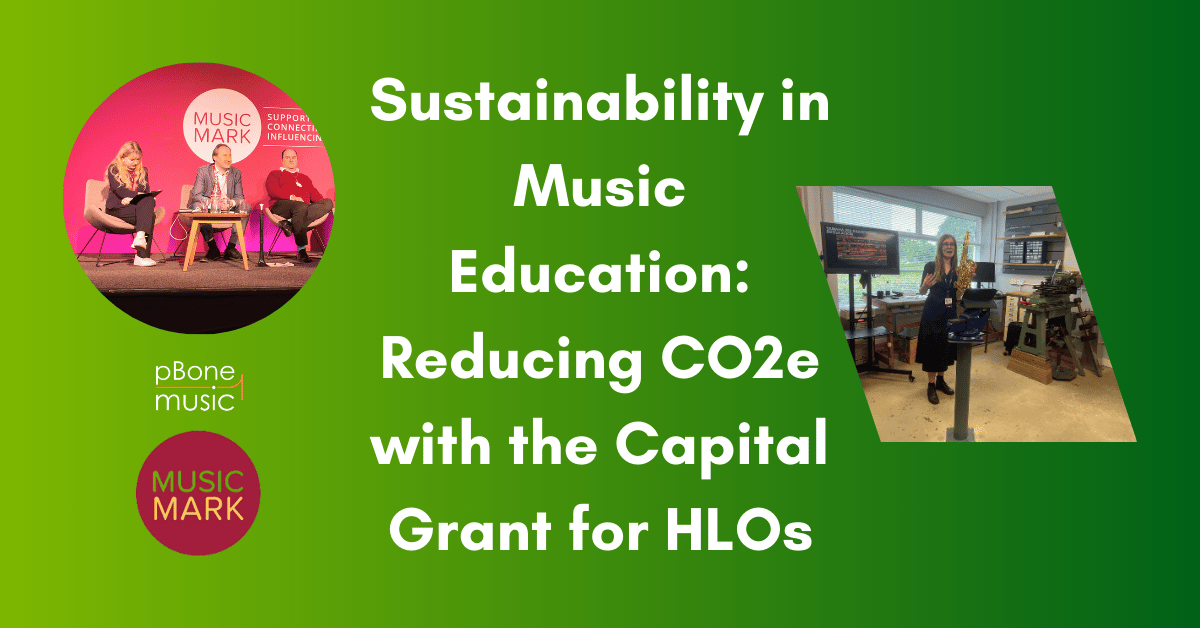
At the 2024 Music Mark Conference, Steven Greenall, CEO of pBone Music, delivered a presentation on sustainability in music education. The panel featured Steven, UK Music CEO Tom Kiehl and Normans Director Andy McKeown. Representing music hubs were Ruth Roberts, Senior Leader of Operations at Kent Music and Gemma Price, Director and Head of Service at Bury Music.
The panellists tackled the complex issue of balancing cost, quality, and environmental impact, delivering a series of provocations to encourage discussion and debate with the Music Mark attendees.
In his presentation, Steven laid out the case for why sustainable procurement isn’t just about instruments; it’s about making choices that benefit students, educators, and the planet.
Watch the presentation and read on for all of the key highlights:
Why Musical Instruments Are Key to Reducing CO2 Emissions
Steven didn’t shy away from stark facts. “The largest contribution of your CO2e, your greenhouse gas emissions in the next two years, will be the instruments you buy,” he explained. Using a powerful illustration - along with a picture of a young Mr Greenall! - he shared the impact of traditional manufacturing on the planet.

“If we bought 200,000 generic brass trombones, it would cost about 25 million pounds—and 18 million kilograms of CO2e. That’s the equivalent of driving 68 million miles in a petrol car.”
The way forward? Consider the environmental footprint of your instruments. By rethinking design and manufacturing, companies like pBone Music have made significant strides. “A standard brass trombone is about 90 kilograms of CO2e,” he noted. “A pBone? Just 8.7 kilograms. That’s one-tenth of the impact.
"If you buy a pBuzz, that's one-one hundredth the carbon impact and the pBuzz is made 20 miles from here (Nottingham) in Mansfield. So there are some options. And in addition, when you start to reduce carbon, manufacturers like ourselves remove it altogether by offsetting the little difference there is.”
Breaking the “Buy Cheap, Pay Twice” Cycle
Steven also addressed a familiar struggle for music educators: budget constraints leading to poor procurement decisions. “Cheaper instruments, lower quality, they break easily. The bad news is that impacts teaching and learning outcomes for children. The warranties were probably not very helpful. The repair cost wasn't economical. Often, it would have been cheaper to buy a new instrument than repair the one you had."
However, there’s good news. The new framework introduced by the Department for Education (DfE) and Arts Council prioritises value over cost. “Of the 60 suppliers that have been approved to provide funding, the criteria for being on that framework was 60 percent around value, service, and sustainability. That was the priority for DfE. Value, service, and sustainability. Only 40 percent: cost. So they are giving you permission to value service and sustainability above everything else."
This shift empowers educators to invest in higher-quality instruments with robust warranties and repairable designs - saving money and resources in the long run.

Examples of Sustainability in Action
Later on in his talk, Steven pointed to inspiring examples of manufacturers taking meaningful steps towards sustainability:
• Blackstar: By replacing polystyrene and plastic packaging with biodegradable and recycled materials, Carry-on by Blackstar has significantly reduced its environmental impact.
• Focusrite: The British audio company Focusrite has appointed a Head of Sustainability, Andy Land, to scrutinise the CO2e impact of every component they manufacture.
Closer to home, pBone Music has championed local production. “Our pBuzz is made just 20 miles away in Mansfield, and our pCorder boxes are produced in Birmingham, the mouthpieces, made in Hinckley in Leicestershire,” he shared. By prioritising UK-based manufacturing, the company minimises transportation emissions and supports the local economy.
Perhaps the most exciting and certainly buzz-worthy development is pBone Music’s partnership with waste management experts, Veolia. “We’re taking recycled waste from towns and turning it into instruments,” he revealed. This innovation represents a significant step forward in making music education truly circular.

What Educators Can Do
Steven made it clear that educators play a pivotal role in driving sustainability. “You have a choice,” he urged. “The instruments you choose will determine the impact of CO2e. Sustainable procurement benefits everyone, but most of all, it benefits the planet.”
He encouraged educators to challenge their suppliers, ask tough questions, and seek out like-minded organisations for support. “Please set high expectations for your suppliers,” he said. “Take your time to do it right. We don’t know if we’ll get this opportunity again.”
The Future of Music Education: Inclusive, Progressive, Sustainable
Greenall’s talk wasn’t just a call to action; it was a roadmap for a better future. By prioritising sustainable procurement, educators can achieve more than just environmental benefits. “Effective, sustainable procurement accelerates progression and outcomes for children,” he concluded. “It provides enhanced value for money and a meaningful contribution to a more sustainable planet.”
Want to learn how you can make sustainable procurement a reality in your school or organisation? Complete our brief form to find out more.
You can also download the slides from Steven's presentation.
Adam is the Content Manager at pBone Music. This should mean that he’s the ideal person to write about himself, but he finds boasting in the third person a little awkward. He honed his word wizardry with a degree in English Language and Literature at the University of Leeds. He has since written copy for clients and businesses across the land, from awards to something beginning with “z”. He also spent a number of years as a musician. He has written pop songs and even jingles for kids, performed more first dances at weddings than you could shake a pBuzz at, and once played a gig for a pie company at The Etihad Stadium in Manchester. When he’s not reminiscing about those good old days, you might find Adam enjoying the football (although as an Everton fan, that can be difficult). He also loves spending time with his partner, Jen, and his family and friends, and sincerely hopes they feel the same way.
Topics: